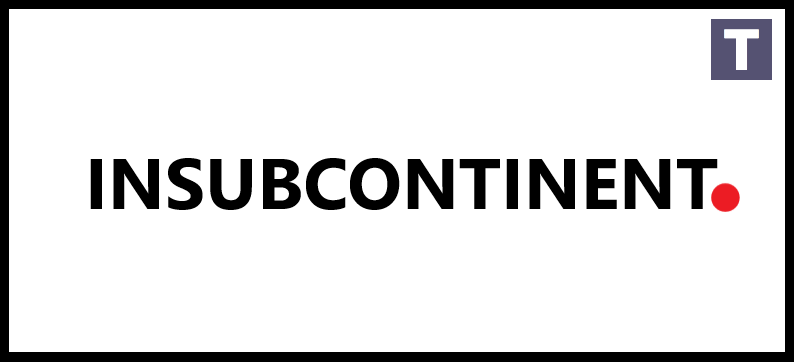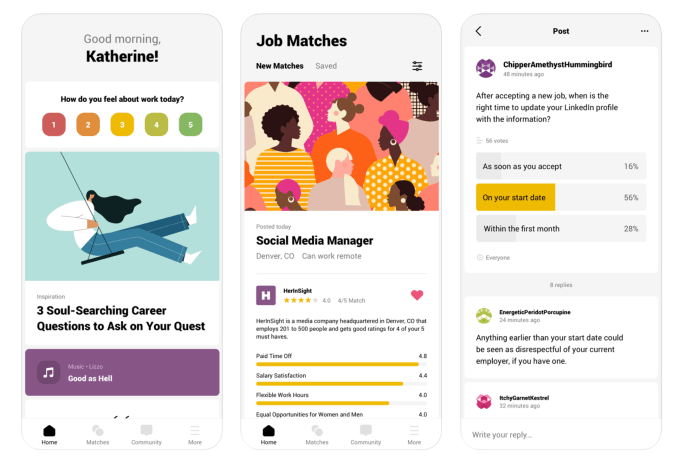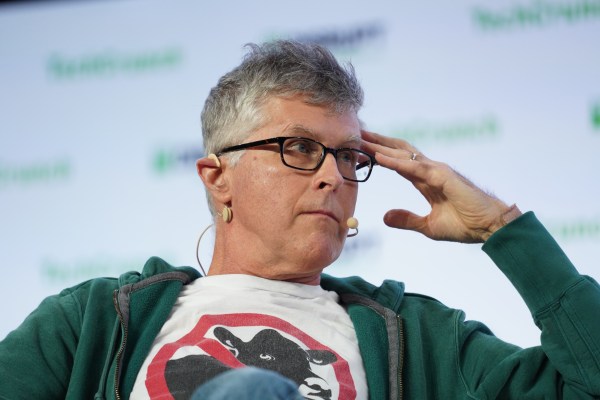Music
Trailers
DailyVideos
India
Pakistan
Afghanistan
Bangladesh
Srilanka
Nepal
Thailand
Iraq
Iran
Russia
Brazil
StockMarket
Business
CryptoCurrency
Technology
Startup
Trending Videos
Coupons
Football
Search
Download App in Playstore
Download App
Best Collections
Technology

We&re excited to announce that Extra Crunch membership is now available for readers in Puerto Rico, Guam and American Samoa.
You can sign up here.
Extra Crunch is a membership program from TechCrunch that features market analysis, weekly investor surveys and how-tos and interviews on growth, fundraising, monetization and other work topics. Members can save time with access to an exclusive newsletter, no banner ads or video pre-rolls on TechCrunch.com, Rapid Read mode and our List Builder tool.
Committing to an annual and two-year plan will save you a few bucks on the membership price and unlock access to TechCrunch event discounts and Partner Perks. The Partner Perks program features discounts and savings on services from AWS, DocSend, Typeform, Zoom and more.
You can sign up or learn more about Extra Crunch here.
Thanks to everyone that voted on where to expand next. If you haven&t voted and you want to see Extra Crunch in your local country, let us know here.
- Details
- Category: Technology Today
With COVID-19 infections climbing in the U.S., officials are desperate for ways to track and control the spread, especially with limited testing available.
Google and Apple announced a joint effort last Friday to create a voluntary anonymous contact tracing network enabled by Android and iOS that would monitor the spread of infections by keeping track of people who are infected and those with whom they come into contact. People would download mobile apps from public health officials that would notify them if they had come into close proximity with infected people who also are using the network. The system would use Bluetooth Low Energy (BLE) transmissions, rather than GPS, so the location would not be tracked, and the tracking data would be stored on the phone and not in a centralized database — all of which will help maintain the privacy of participants.
However, there are numerous other COVID-19 mitigation efforts that are not as privacy-friendly because they employ location tracking and, most likely, central data storage.
Google announced it will release &Community Mobility Reports& that show trends over time by geography based on anonymized aggregated data from phones of people who have turned on the Location History setting. Facebook and other companies are providing to epidemiologists from around the world anonymized, aggregated data from mobile phones as part of the COVID-19 Mobility Data Network.
And the Centers for Disease Control (CDC) is tracking the anonymized movements of American citizens based on location data from mobile advertising companies. While privacy advocates consider these sort of tracking mechanisms to be invasive and unsettling, this data does help to reveal the public spaces still drawing crowds and guide subsequent policy decisions, but it raises concerns.
While I applaud government efforts to more effectively stop the spread of infections, there needs to be specific conditions and limitations on how this data is used, or we as a nation will face serious consequences. The government must mobilize to combat this invisible enemy, but we must also have parameters for how data is protected and used. Specifically, we need five guarantees.
Temporality
The PATRIOT Act, passed just six weeks after 9/11, gave the government unprecedented power to spy on American citizens. This may have made sense at the time, but the government continues to vacuum up millions of phone calls and text messages to this day. If companies like Google and Facebook are willing to share data with the government, there needs to be a clear and defined period as to the time span of the sharing and the retention period of that shared data.
Civil liberties
Following the September 11th attacks, law enforcement departments like the NYPD conducted illegal surveillance activities of the local Muslim population. That program has been compared to the Japanese-American internment camps of World War II and the FBIsurveillance of African Americans who opposed segregation in the civil rights movement.
We must not allow this current pandemic to become another example of civil liberties falling by the wayside. The data being shared to protect us now cannot be used for surveillance or discrimination tactics, now or in the future.
Transparency
Any company that shares sensitive data with the government, such as location data, must be required to provide timely and fulsome transparency reports that are easy for the public to interpret.
Limited use and purpose specification
The OECDFair Information Practice Principles (FIPPs) state that personal data should not be used for any purpose beyond the specified purpose of the data processing activity. We&ve witnessed numerous media exposés and regulatory actions against companies sharing location data for secondary purposes. In this case, location data collected and used to limit the spread of the virus should only be used for that specific purpose.
Data security
The governmentwell-meaning intentions to protect citizens does not automatically mean it will secure their sensitive data. If anything, there will likely be an uptick in cybercrime during the pandemic. The government owes it to its citizens to ensure the appropriate administrative, technical and physical safeguards are in place.
As U.S. officials explore their options, itunclear what lessons from history or types of data protections, if any, are actually being discussed. We can only go on what we&ve heard from news reports: Palantir, the data mining company that uses War on Terrortools to track Americans, is in talks with the CDC to do data collection related to disease tracking.
Facial recognition company Clearview AI, which has been harshly criticized for selling its software to law enforcement, private companies and authoritarian regimes, is talking to state agencies about using its data-driven insights to track infections. Unacast has been giving local counties social-distancing grades based on citizens& location data.
Let freedom ring
The U.S. does need to find a practical path forward. There are actually several different types of location data collected, used and shared by a variety of different commercial entities — so it would be best to first determine which data is most valuable and who are the key partners. Doctors, researchers, academics, ethicists and legal experts should be actively included in conversations with these tech companies.
In addition, privacy preserving techniques must be used when sharing location data. The Apple-Google joint effort is the latest; others include Private Kit: Safe Paths and MITSafeTrace platform, which also allow users to voluntarily share data through means that are anonymized, decentralized and encrypted.
The challenge here is that itdifficult to actually guarantee that anonymized data (data that has no chance of identifying a person) is truly anonymous, without being subject to additional contractual, technical and administrative controls. And platforms that rely on users voluntarily submitting their location and health status could end up with a low adoption rate,leading to skewed and inaccurate results.
Should it then be left up to our government to mandate all American citizens with a smartphone share their location data in the name of public health? Whatever happens, now, more than ever, itimperative that our local, state and federal authorities take into account the various data sharing proposals in a manner that puts the American citizen first.

- Details
- Category: Technology Today
Read more: COVID-19 might have its very own PATRIOT Act, yet we need privacy warranties
Write comment (99 Comments)Whenever a system bursts out, companies emerge to take on its reach by building their product or services atop it. It happened with Twitter and facebook as well as Slack. Now, it&& s occurring with Zoom, the video clip conferencing firm that took the world by storm earlier this year as the coronavirus sent individuals around the globe inside your home as well as right into self-imposed seclusion. It&& s not a brand-new trend. A lot of business are marketing their items through the Zoom Application Marketplace, which released in the loss of 2018 and also now includes 18 pages of service providers. However Grain, founded in 2018 in San Francisco, is amongst the very first to build its whole business around it, at least as a beginning factor. What is that service? According to founder as well as Chief Executive Officer Mike Adams, the concept is to catch web content in Zoom calls that can be saved and shared throughout systems, including Twitter, Dissonance, Notion, Slack as well as iMessages. Say a pupil intends to make note; she or he can tape component of what an instructor is saying to conserve or show to schoolmates, without having to rewatch a whole lecture. The same is real in work settings. By utilizing Grain, a colleague can flag the most crucial little bits of information that was conveyed, after that share simply those little bits using a clip that has its own unique URL. Grain also records material in clips and also permits individuals to transform on shut subtitles if they select. The video can range from 30 secs as much as 10 minutes. They can likewise be strung with each other right into reels to create recap highlights. (These have no time limit.) Not last, customers can cut or adjust the size of the highlight after it has been tape-recorded, along with control who else can modify the video clip afterward to protect against wicked stars from controling the bits. Adams claims he as well as his brother, Jake —-- a previous software designer at Branch Metrics with whom he co-founded the business —-- are also utilizing Grain to conserve bits of precious minutes on Zoom including nieces and also nephews, though the focus is quite on the firms as well as schools that will certainly pay on a per-seat basis for the software. Indeed, Adams states the idea for Grain was really birthed at the last business he co-founded: MissionU, a Zoom-based one-year alternative to a standard university whose trainees weren&& t requested for tuition however rather consented to turn over approximately 15% of their incomes for 3 years once they landed a job that paid$ 50,000 or more. MissionU-- which was founded in 2016 and also raised $11.5 million from investors —-- marketed to WeWork in 2018 in a stock deal before its trainees gained anything (they were released from their income-sharing arrangements). Still, the experiment was long sufficient that Adams, that left MissionU at the time of the sale, says he saw firsthand the requirement for much better devices to assist pupils capture what&& s crucial in their on-line web content. The question, obviously, is whether Zoom additionally sees the opportunity. Counting so greatly on one more firm is always a danger. (See Facebook and Twitter and the long list of third-party designers that have been melted by both companies.). If Zoom, which is beginning to make venture-like bets, were a financier in Grain, it might help inoculate it from prospective competition later on. Still, that it isn&& t didn & t dissuade other investors that are wagering that Zoom will show close friend as well as not adversary. As a matter of fact, late in 2014, Grain raised$ 4 million over two seed rounds from a lengthy checklist of notable investors, including Acrew Capital, Founder Collective, Peterson Partners, Slack Fund, Scott Belsky, Sriram Krishnan, Andreas Klinger, Scooter Braun as well as others. Now its 11-person team is ready to take the wraps off what they & ve been integrating in beta with some of that capital. Definitely, Grain-- which intends to eventually integrate with numerous other firms-- could do worse as springboards go than Zoom, one of the unusual new outbreak system firms in memory as well as a tool that, early this week, Oracle founder Larry Ellison called an && crucial solution & that will transform how job is done. Zoom has long been powered by viral end individual fostering, taking pleasure in growth inside and on the surface as a result of the nature of video clip conferencing throughout companies. Currently, its pick-up as a customer business is following a comparable trajectory, with a high percentage of brand-new customers who are invited to Zoom calls eventually authorizing up for the solution to ensure that they can themselves organize a phone call. If Grain obtains fortunate, some percentage of that percent will additionally discover Grain.
- Details
- Category: Technology Today

In a message posted to its internal communications channel earlier this week, the massive startup accelerator Y Combinator said it will change the terms of its own PPP (the YC pro rata investment program) and investing in companies raising seed and Series A rounds on a case-by-case basis.
The company began a policy of investing in every seed and Series A round for its portfolio companies back in 2015.
Since then, it has taken a 7% stake in every company that raised a priced seed and Series A round, investing in more than 300 Y Combinator companies over nearly 500 rounds.
Under its new policy, the accelerator is reducing its investment size from 7% to 4% and is only investing on a case-by-case basis going forward.
The reason for the change is that the number of companies in its portfolio has gotten too large for it to invest and some of the limited partners who back the acceleratoroperations are balking at making commitments to the pro rata investment program.
&We have significantly exceeded the funds we raised for pro ratas, and the investors who support YC do not have the appetite to fund the pro rata program at the same scale,& the accelerator wrote in a post seen by TechCrunch. &In addition, processing hundreds of follow-on rounds per year has created significant operational complexities for YC that we did not anticipate. Said simply, investing in every round for every YC company requires more capital than we want to raise and manage. We always tell startups to stay small and manage their budgets carefully. In this instance, we failed to follow our own advice.&
For entrepreneurs who take investments from the accelerator, the change is pretty significant. On the acceleratorinternal messaging board they worried about the potential optics of having the accelerator not make a follow-on commitment.
YC addressed those concerns by saying it would not make an investment decision until a company had already received an initial term sheet from a lead investor.
The changes will take effect on May 8, 2020, the investor said.
&In the future, we will no longer invest automatically in every priced seed and Series A/B round. Instead, we will exercise pro rata rights on a case-by-case basis, like other investors on your cap table,& the accelerator wrote. &We&ve heard your feedback that YCpro rata allocation is bigger than what some of you would prefer. So for those investments we do make, we will reduce the size of our pro rata and simplify its calculation to be a flat 4% participation right in each priced round. To calculate the size of YCpro rata investment in your round, simply multiply the amount of capital you are raising by 4%. If our ownership right before the round is less than 4%, we will cap our investment in the round at our then-current ownership. Our intention is not to have a super pro-rata right.&
Even with the reduced investment size, YC said it would only make investments in roughly one-third of its portfolio.
&The YC Continuity team will manage these investment decisions and will work very hard to inform you within a day or two of receiving your materials,& the accelerator wrote. &We will honor any pending pro rata investments for term sheets signed before May 8. But we wanted to communicate this message broadly so that founders can plan accordingly.&
- Details
- Category: Technology Today
Nearly 60% of the over 700,000 jobs lost in the first wave of pandemic layoffs were jobs held by women, according to data from the Institute for WomenPolicy Research. But women in search of a new job often have different requirements for employers, compared with their male counterparts. Beyond the usual concerns around hours, salaries, and benefits, women often want to know about a companyculture, policies around work-life balance, child care, mentorship, growth opportunities and other factors. Thatwhere InHerSightnew mobile app for women job seekers aims to help.
The InHerSight platform, first launched in 2015, is something of a Glassdoor for women job seekers. Here, women anonymously rate their workplaces, which allows the company to collect data on 16 key metrics that often matter more to working women.
This includes flexible work hours, maternity and adoptive leave, child care, availability of lactation rooms, salary satisfaction, mentoring, management opportunities for women, and female representation in leadership positions.
Women can then use this database to research companies and find jobs that better support their own career goals — as well as avoid those that do not.
To date, the company says women have anonymously rated over 100,000 companies on its platform. Last year, it matched users to over 3 million open positions and now expects this number to grow significantly due to the current unemployment levels.

The new InHerSight mobile app will do more than offer job matches, however. Ita more comprehensive experience.
When logged in with a free, anonymous account, women can set their goal for job seeking. This can be something as simple as &Get Hired,& or a more nuanced condition, like &Find Balance.& They then input career and job search data like experience, job title, company culture, and benefit &must-haves.&
InHerSight will curate the experience from there to cater to the userparticular needs.
On the apphome feed, job seekers will gain access to articles, podcasts, music, stats and other tidbits curated based on their personal interests and goals. This content will refresh daily, InHerSight says.
Women can also anonymously take polls and ask questions in the InHerSight community, which is also accessible through the app.
And based on the criteria provided, the app will send users up to 10 new job matches per day for companies that are hiring.
&We&re excited to provide women with such a tailored job search tool and resource for navigating their careers,& said InHerSight co-founder and CEO Ursula Mead, about the applaunch. &We believe strongly at InHerSight that every womancareer path is different, and we want to give them the power and insight they need to pursue jobs at companies they love.&
Despite the massive unemployment caused by the COVID-19 pandemic, some employers are still hiring. The tech giants in particular continue to be talent-hungry, even as smaller startups trim staff and freeze hiring. Others in e-commerce, including Walmart, Amazon and grocery delivery providers like Instacart, are rapidly expanding their workforce.
InHerSight, however, doesn&t really focus on finding your next gig, but rather the next step in your career. To date, its platform has been used by employers including government agencies and household names like Amazon,Google,Coca-Cola,Walmart, andMicrosoft.
The N.C. Triangle-area company is backed by $5 million from investors including Motley Fool Ventures, GrowthX, and Carolina Angel Network, among others. Its customers are the employers looking to recruit female talent. Though InHerSight didn&t provide specifics, it claims high retention about its customer base due to its ability to prequalify their job offers for women across key aspects of company culture.
&Our hope is that women using the app after being laid off or while furloughed can jumpstart their search using the tools we&ve provided,& said Mead, of the new app. &Of course, we want women who need jobs to find them as fast as possible, but we also want to return to them that sense of control over their careers,& she added.
The new InHerSight app is available as a free download on iOS and Android.
- Details
- Category: Technology Today
Read more: InHerSight's new application customizes work suits to women's occupation objectives
Write comment (90 Comments)
Starting tomorrow, 777 supermarkets in California, Illinois, Indiana, Iowa and Nevada will begin stocking the Impossible Foods plant-based meat substitute.
Fueling the increased distribution and a push to expand its product suite and geographic footprint domestically and internationally is a $500 million round of funding the company closed in March.
Some of that money is supporting the companydebut at stores like Albertsons, Jewel-Osco, Pavilions, Safeway and Vons.
In all, the company said it would be in nearly 1,000 grocery stores by tomorrow. That includes all Albertsons, Vons, Pavilions and GelsonMarkets in Southern California; all Safeway stores in Northern California and Nevada; Jewel-Osco stores in Chicago, eastern Iowa and northwest Indiana; Wegmans stores on the East Coast and Fairway markets in and around New York.
Since its debut in September, the company said it was the number one item sold at the locations it was available on the East and West coasts.
The company12-ounce packages are sold for somewhere between $8.99 and $9.99 and it plans to soon introduce the Impossible Burger at even more stores nationwide.
&We&ve always planned on a dramatic surge in retail for 2020 — but with more and more Americans& eating at home, we&ve received requests from retailers and consumers alike,& said Impossible Foods& president Dennis Woodside, in a statement. &Our existing retail partners have achieved record sales of Impossible Burger in recent weeks, and we are moving as quickly as possible to expand with retailers nationwide.&
Even as the company announced its expansion, it made moves to assuage any consumer concerns over the processes in place at its manufacturing facilities.
Impossible Foods said it had instituted mandatory work from home policies for all of its employees who can telecommute; restricted visitors to its facilities and those operated by co-manufacturers; banned all work-related travel; and implemented new sanitizing and disinfection procedures at its workplaces.
&Our No. 1 priority is the safety of our employees, customers and consumers,& Woodside said. &And we recognize our responsibility for the welfare of our community, including the entire San Francisco Bay Area, our global supplier and customer network, millions of customers, and billions of people who arerelying on food manufacturers to produce supplies in times of need.&
The company said it was proceeding with its research and development initiatives; accelerating the ramp of its production facilities; and moving to broadly commercialize its Impossible Sausage and Impossible Pork products.
Impossible Foods has raised $1.3 billion from investors, including Mirae Asset Global Investments, Khosla Ventures, Horizons Ventures and Temasek.
- Details
- Category: Technology Today
Read more: Impossible Foods turns out to almost 1,000 brand-new food store and grocery stores
Write comment (91 Comments)Page 964 of 1437

 14
14





